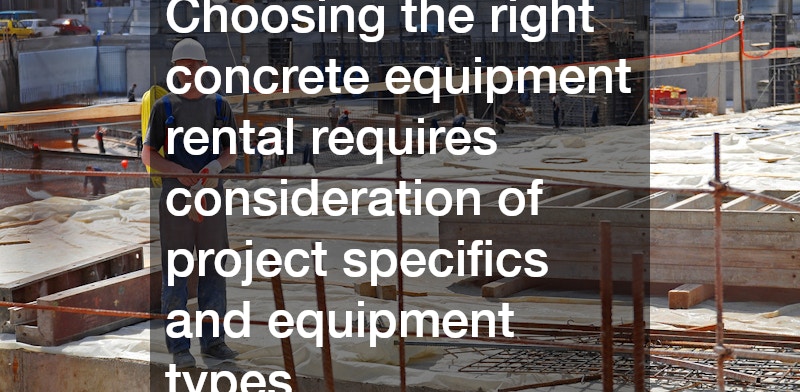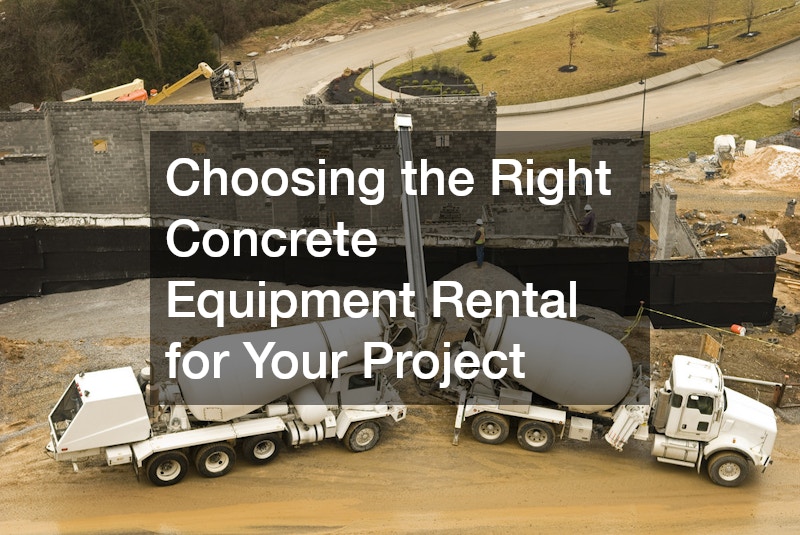In the world of construction and renovation, concrete equipment rental is often a cost-effective solution for both professionals and DIY enthusiasts. Whether you’re undertaking a small home improvement project or managing a large-scale construction site, renting equipment can save you significant time and money. This article will guide you through key considerations when choosing the right rental equipment for your concrete project, ensuring efficiency and success.
What Types of Concrete Equipment Are Available for Rent?
1. Concrete Mixers
Concrete mixers are essential for any project involving the mixing of raw materials to create concrete. There are various types of mixers available, from portable drum mixers ideal for small projects to volumetric mixers suitable for larger industrial tasks. When selecting a mixer, consider the volume of concrete needed and the specific requirements of your project to make an informed decision.
For smaller residential tasks, a portable mixer might suffice, offering convenience and ease of use. These mixers are perfect for jobs like driveway repairs or small slab pours, providing the flexibility to mix concrete on-site. On the other hand, for larger construction projects, a stationary or volumetric mixer may be necessary to handle higher volumes efficiently.
2. Concrete Pumps
Concrete pumps are pivotal in transporting mixed concrete to specific site locations efficiently. There are two main types: boom pumps and line pumps, each serving distinct purposes. Boom pumps are more suited for larger projects with their extended arm, allowing for precise placement of concrete in high or hard-to-reach areas.
Line pumps, conversely, are ideal for smaller jobs or sites with restricted access. They are generally more affordable and easier to maneuver, making them an excellent choice for residential projects or sites with narrow entryways. When deciding on a pump, evaluate the site layout and project requirements to choose the most suitable option.
3. Concrete Saws
Concrete saws are indispensable for precision cutting concrete slabs, walls, and other structures. From handheld saws to wall-saw systems, these tools are designed to offer control and accuracy in cutting tasks. The choice of a saw largely depends on the thickness and type of material to be cut and the specific needs of the project.
How to Determine the Right Equipment for Your Project?
1. Assessing Project Scale and Scope
The first step in choosing the right equipment is assessing your project’s scale and scope. This involves understanding the size, complexity, and specific requirements of the job at hand. Accurately evaluating these factors will determine the type and amount of equipment necessary to complete the project efficiently.
For small-scale projects like building a patio or a garden walkway, simpler and less expensive equipment might suffice. In contrast, large-scale construction such as multi-story buildings or extensive renovations requires more robust machinery capable of handling high volumes and different functions. Matching the equipment size to project scale ensures efficient use of resources and reduces unnecessary expenses.
2. Understanding Project Timeline
The timeline of a project is a crucial factor in equipment rental decisions. A tight schedule may require high-performance machinery to fast-track operations, whereas a more extended timeline permits more flexibility with equipment choice. Understanding the project’s duration helps in aligning equipment rental periods effectively and avoiding unnecessary costs.
3. Considering Equipment Compatibility and Efficiency
Equipment compatibility and efficiency are paramount in optimizing project outcomes. Selecting equipment that seamlessly integrates with existing gear prevents technical hardships and maximizes productivity. This requires a thorough understanding of both the project needs and the specifications of available rental equipment.
Compatibility considerations encompass equipment size, power requirements, and functional features. For example, ensuring that a concrete mixer is compatible with your site’s power source eliminates potential operational hiccups. Compatibility directly impacts efficiency, reducing the risk of disruptions and enhancing task execution smoothness.
What Should You Look for in a Rental Provider?
1. Reputation and Reviews
Before selecting a rental provider, thoroughly researching their reputation and customer reviews is crucial. A company’s reputation often reflects its reliability, service quality, and customer satisfaction levels. Prioritizing providers with a strong track record offers confidence that you’re partnering with a dependable and professional supplier.
2. Equipment Maintenance and Support
The provider’s approach to equipment maintenance and support should be a key consideration. Well-maintained equipment reduces the risk of malfunctions and ensures seamless project progression. Inquire about maintenance schedules and procedures to ascertain rental equipment reliability.
3. Pricing and Rental Terms
Understanding pricing and rental terms is vital in managing project budgets effectively. Rental pricing can vary based on equipment type, rental duration, and additional services such as delivery and setup. Comparing pricing structures from different providers helps identify competitive rates and potential cost savings.
Choosing the right concrete equipment rental requires careful consideration of project specifics, equipment types, and rental providers. By understanding the scope and timeline of your project, you can select the most efficient and compatible equipment solutions. Following the guidance in this article ensures a successful project while maintaining budget and efficiency.
Ultimately, successful equipment rental involves aligning technical requirements with logistical strategies, ensuring all project elements are in harmony. With the right preparation and knowledge, you can confidently tackle any concrete project with the assurance of using the best available rental options.

